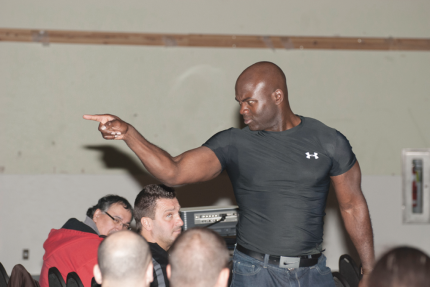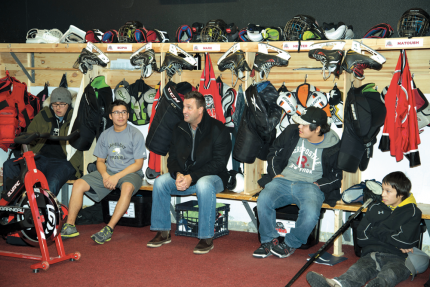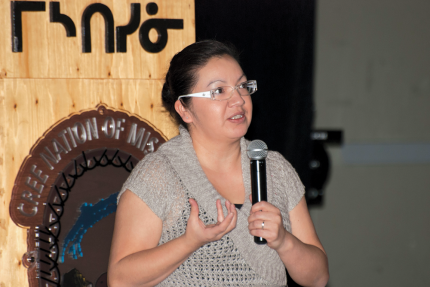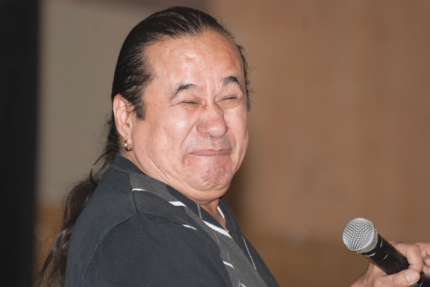When you hear the word “bullying,” do you think of something serious, or do you think of it as child’s play? Are bullies are a minor problem that kids endure at school, who are easy to forget as soon as they’re out of the way?
The Cree Regional Authority’s (CRA) Department of Justice wants you to think a little deeper about the meaning of bullying.
“More and more, we’re getting calls about people who don’t feel comfortable or safe going to school or other regular environments that everyone has the right to be in,” says Donald Nicholls, Director of the CRA’s Justice and Correctional Services Department. “Nationally, there has been a lot of attention on bullying in the last year, but we’ve known for a long time, with our clients and everyone that we deal with, that that bullying is something that would often come up.”
So over six months ago, the CRA, in partnership with the Cree Health Board (CHB) and the Cree School Board (CSB), began organizing a three-day conference on bullying. The conference took place at Mistissini’s Neoskweskau Complex November 26-28 (and was broadcast live on the JBCCS), and drew a variety of presenters from all over the Cree Nation and elsewhere in Canada.
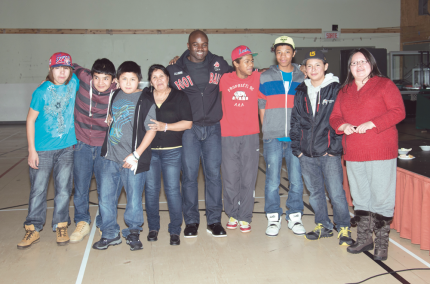 “The three organizations all realized this is an important issue that not only impacts schools but also the workplace and the community,” Nicholls said. “Our ultimate goal is to make safer environments: to make safer schools, safer communities and safer workplaces. But we also want to help people who are working on their healing – both victims and those who perpetuate bullying. We want to work on both sides, to help bullies unlearn their activities, and change those into more positive activities. And we want to work with schools and communities so there are fewer victims of bullying. Because [bullying] leaves scars, and the trauma that people face can be intergenerational.”
“The three organizations all realized this is an important issue that not only impacts schools but also the workplace and the community,” Nicholls said. “Our ultimate goal is to make safer environments: to make safer schools, safer communities and safer workplaces. But we also want to help people who are working on their healing – both victims and those who perpetuate bullying. We want to work on both sides, to help bullies unlearn their activities, and change those into more positive activities. And we want to work with schools and communities so there are fewer victims of bullying. Because [bullying] leaves scars, and the trauma that people face can be intergenerational.”
The conference boasted an impressive array of speakers, including hockey greats Stephane Richer and Chris Nilan, along with Argonauts football veterans Chuck Winters and Orlando Bowen. Following careers in professional sports, all four athletes began working to stop bullying and violence. The line-up also included York University Professor Debra Pepler, Scientific Co-Director of the anti-bullying program PREVNet, who is considered one of Canada’s foremost experts on bullying, and Mike Neuts, a Stratford Ontario parent who lost his 10-year-old son to a bullying-related suicide.
Nicholls says they were careful to balance Canadian speakers with Crees – these included EEPF Director Reggie Bobbish, Kathleen Wooton from the CSB, and Lisa Petagumskum from the CHB speaking about the Cree SNAP (Stop Now and Plan) anger-management program for kids. Also speaking were Nishiyuu Walkers founder David Kawapit and former Deputy Grand Chief Ashley Iserhoff, both of whom spoke about being bullied when they were younger. And from a Cree Nation farther afield, Plains Cree comedian Don Burnstick gave a workshop on bullying, followed by a performance the following night.
Intended to reach the whole community, the conference branched out beyond the Neoskweskau Complex to include two assemblies per day for high-school students (and one daily for elementary-school students) at Voyageur Memorial School, as well as daily visits with young athletes.
It was important, said Nicholls, for young people to hear that their leaders and heroes had dealt with bullying in their own lives. “Because we knew there was bullying in sports, we had [conference participants] meet each night with the Cree Nation Bears. Richer and the others went to talk with them.”
Nicholls said former Habs enforcer Nilan “talked about standing up and defending people, whether you’re being bullied or not. You shouldn’t allow that kind of activity to occur around you. You have to speak up and say, ‘This is not right.’”
During the school visits, principals asked the speakers to stay and talk to individual students affected by bullying – both victims and perpetrators. Similar one-on-ones occurred in the community’s group homes, where speakers visited with kids in open custody or transitional situations and talked to them about anti-social behaviour and life choices.
Importantly, the conference was intended to bring frontline workers up to date on current practices in dealing with the issue. Above all, Nicholls says that the goal of the conference was to change the public perception of bullying by encouraging people to learn more about the issue.
“We wanted to start a dialogue, and we knew that this was going to be the first of many conversations,” he said. The conference was organized specifically in a way to make it as desirable as possible for the public to attend, and as widely accessible as possible. Movies, comedy and a feast on the second night were intended to draw the public in. Radio coverage meant that those who couldn’t attend during the day could listen, while the nightly events meant that those who were at work could still be a part of the event and meet the speakers.
Assessing the conference’s success in reaching the public, Nicholls said he felt that most attendees would come to another conference like it.
“The people who came to the conference felt very happy with it,” Nicholls said. “They learned something, and they liked the resources. Plus the stories they heard opened up within people their own experiences, and they wanted to share those. It opened the door for people to say, ‘Yes, I was bullied, I knew someone who was bullied, or maybe I did something in the past.’”
The conference also benefited the schools.
“We tried a new program for Grade 5 and 6 students: we had a ‘From Me to We’ program about how to turn negative energy into positive leadership,” he noted.
But Nicholls is quick to underline that there was a reason why the conference was called the First Cree Anti-Bullying Conference: it was intended to be the beginning of something that the Nation will have to return to again and again.
“It’s going to move around,” Nicholls said. “This conversation has just begun, and we want the dialogue to grow – to get the whole Nation involved. We need to set up an action plan as a Nation of how we’re going to deal with bullying, and figure what it is we need to do to create an environment that’s safer for our children, our workers, and our community members.”

